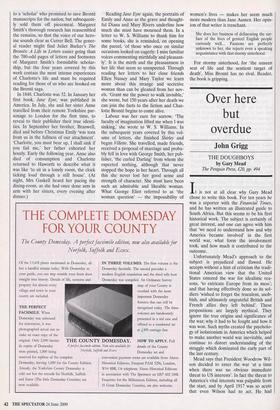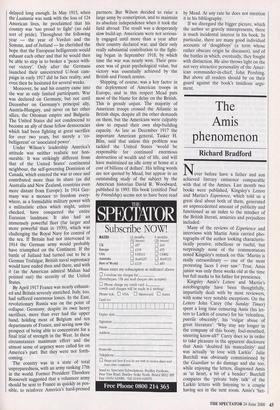Over here but overdue
John Grigg
THE DOUGHBOYS by Gary Mead
The Penguin Press, £20, pp. 494 It is not at all clear why Gary Mead chose to write this book. For ten years he was a reporter with the Financial Times, and he has written an illustrated guide to South Africa. But this seems to be his first historical work. The subject is certainly of great interest, and one can agree with him that 'we need to understand how and why America became involved' in the first world war, what form the involvement took, and how much it contributed to the outcome.
Unfortunately Mead's approach to the subject is prejudiced and flawed. He accepts without a hint of criticism the tradi- tional American view that the United States entered the war for idealistic rea- sons, 'to extricate Europe from its mess'; and that having effectively done so its sol- diers 'wished to forget the truculent, snob- bish, and ultimately ungrateful British and French allies they left behind'. These propositions are largely mythical. They ignore the true origins and significance of the war; why it had to be fought and how it was won. Such myths created the psycholo- gy of isolationism in America which helped to make another world war inevitable, and continue to distort understanding of the struggle which dominated the early part of the last century.
Mead says that President Woodrow Wil- son decided to enter the war 'at a time when there was no obvious immediate threat to US interests'. In fact the threat to America's vital interests was palpable from the start, and by April 1917 was so acute that even Wilson had to act. He had delayed long enough. In May 1915, when the Lusitania was sunk with the loss of 124 American lives, he proclaimed that his country was 'too proud to fight' (an odd sort of pride). Throughout the following year — the year of Verdun and the Somme, and of Jutland — he cherished the hope that the European belligerents would exhaust each other and that he would then be able to step in to broker a 'peace with- out victory'. Only after the Germans launched their unrestricted U-boat cam- paign in early 1917 did he face reality, and even then he hesitated for several weeks.
Moreover, he and his country came into the war as only limited participants. War was declared on Germany, but not until December on Germany's principal ally, Austria-Hungary, and never on her other allies, the Ottoman empire and Bulgaria. The United States did not condescend to become an ally of those fellow democracies which had been fighting at great sacrifice for over two years, but merely a 'co- belligerent' or 'associated power'. Under Wilson's leadership America's attitude was neither realistic nor hon- ourable. It was strikingly different from that of the United States' continental neighbour, the self-governing Dominion of Canada, which entered the war at once and contributed more than its share (as did Australia and New Zealand, countries even more distant from Europe). In 1914 Ger- many was a menace to freedom every- where, as a formidable military power with a militaristic ethos which might, unless checked, have conquered the entire Eurasian landmass. It also had an immensely powerful fleet (far larger and more powerful than in 1939), which was challenging the Royal Navy for control of the sea. If Britain had not intervened in 1914 the German army would probably have triumphed on the Continent. If the battle of Jutland had turned out to be a German Trafalgar, British naval supremacy would have ended then and there, and with it (as the American admiral Mahan had pointed out) the security of the United States.
By April 1917 France was nearly exhaust- ed and Britain severely stretched. Italy, too, had suffered enormous losses. In the East, revolutionary Russia was on the point of collapse. Germany, despite its own heavy sacrifices, more than ever had the upper hand, holding most of Belgium and ten departments of France, and seeing now the prospect of being able to concentrate for a final trial of strength in the West. In these circumstances maximum effort and the utmost sense of urgency were called for on America's part. But they were not forth- coming. The country was in a state of total unpreparedness, with an army ranking 17th in the world. Former President Theodore Roosevelt suggested that a volunteer army should be sent to France as quickly as pos- sible, to reinforce America's hard-pressed partners. But Wilson decided to raise a large army by conscription, and to maintain its absolute independence when it took the field abroad. The result was a desperately slow build-up. Americans were not serious- ly engaged until more than a year after their country declared war, and their only really substantial contribution to the fight- ing began in September 1918, by which time the war was nearly won. Their pres- ence was of great psychological value, but victory was essentially achieved by the British and French armies.
Shipping, of course, was a key factor in the deployment of American troops in Europe, and in this respect Mead puts most of the blame for delay on the British. This is grossly unjust. The majority of American troops crossed the Atlantic in British ships, despite all the other demands on them, but the Americans were culpably slow to expand their own ship-building capacity. As late as December 1917 the important American general, Tasker H. Bliss, said that unless this problem was tackled the United States 'would be responsible for continued enormous destruction of wealth and of life, and will have maintained an idle army at home at a cost of billions of dollars'. His telling words are not quoted by Mead, but appear in an outstanding study of the subject by the American historian David R. Woodward, published in 1993. His book (entitled Trial by Friendship) seems not to have been read by Mead. At any rate he does not mention it in his bibliography.
If we disregard the bigger picture, which the author so gravely misrepresents, there is much incidental interest in his book. In particular, there are many good individual accounts of 'doughboys' (a term whose rather obscure origin he discusses), and of the battles in which, eventually, they fought with distinction. He also throws light on the not very attractive personality of the Amer- ican commander-in-chief, John Pershing. But above all readers should be on their guard against the book's insidious argu- ment.



































































 Previous page
Previous page